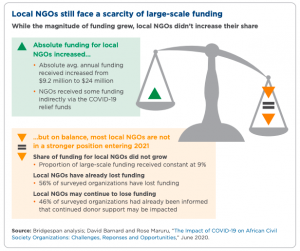When the first confirmed sub-Saharan Africa case of Covid-19 was detected in Nigeria in February 2020, many African governments moved quickly to contain the virus. While other parts of the world struggled to slow the pandemic, Africa was lauded by many as better prepared, owing in part to the continent’s experiences with past public health crises like Ebola.
African philanthropy was part of this story. Within a month of the first reported Covid-19 case in sub-Saharan Africa, South Africa, Nigeria, and Kenya set up specialised Covid-19 relief funds – and African donors gave 62 percent of their large gifts (i.e. larger than US$ 1 million) by value to those funds in 2020. In total, as our recently published research brief highlights, there were 45 large gifts committed from March through December of 2020 in three countries, totalling $269 million. To put it plainly, in just one year, African philanthropists gave seven times the annual average number of large gifts for the previous decade. While the response’s scale was unprecedented, it echoed the history of African philanthropy responding in times of crisis: In earlier research, we found that roughly 30 percent of large gifts by African philanthropists were committed to disaster relief between 2010 and 2019.
In 2020, a year defined by a pandemic, all 45 large gifts went towards Covid-19 response. Despite this outpouring of philanthropy, only two of the 45 large gifts went to African NGOs (namely, those headquartered on the continent), with the majority flowing to relief funds. This finding stood out to us: in a year of so much giving, why did we not see more of these large gifts flowing from African philanthropy to African NGOs?
Limited funding for African NGOs
The finding around limited funding reaching African NGOs is not unique to 2020: last year, the proportion of total large-scale funding going to African NGOs remained consistent with the previous ten-year period, at 9 percent of the total dollar amount donated.

Graphic: Bridgespan
There are several reasons why African NGOs weren’t at the top of the list for large gifts to the pandemic response – for one thing, the relief funds were principally created to support government efforts to respond to the crisis, with a particular emphasis on healthcare infrastructure. We also heard that the leaders of these relief funds were predominantly from the private sector and government. ‘I don’t think nonprofits had a seat at the table in terms of the [Covid-19 response strategy] and planning,’ African development expert David Barnard observed.
To be sure, local organisations did receive some funding indirectly via the Covid-19 relief funds, particularly as part of humanitarian response efforts. For example, in South Africa, the Solidarity Fund tapped local organisations for food distribution and activities aimed at addressing gender-based violence during the national lockdown. Notwithstanding this indirect funding, however, early research indicates that the effect of the Covid-19 crisis on African organisations has, on balance, been adverse. For example, a survey conducted by @AfricanNGOs and EPICAfrica in May of 2020 found that 56 percent of the African civil society organisation respondents had lost funding and half had already reduced costs.
Looking to the Future: More funding for African organisations?
Funders on the continent have responded in unprecedented ways to fight the coronavirus, not only with the sheer magnitude of large-scale giving, but also by investing in new vehicles through which to direct much needed help. Still, for many African NGOs, the Covid-19 crisis has presented significant financial and operational challenges.
It has also exacerbated historical challenges related to funding constraints. As noted by Mosun Layode, the Executive Director of the African Philanthropy Forum, ‘while there is increased giving in Africa, a lot of the philanthropists are giving to their own foundations [rather than grant-making]… which leaves local nonprofit organisations relying on international donors.’ Yet African NGOs face constraints in fundraising from donors outside the continent as well, where there is a long history of non-African philanthropy supporting international organisations over local ones. This dynamic has received heightened attention in 2020 as racial justice protests globally have prompted leaders to call for ‘closing the race gap in philanthropy‘ and initiating a ‘Black Lives Matter reckoning‘ for the development sector in Africa.
Understanding this complex set of funding disparities facing African organisations is the subject of an ongoing research effort that Bridgespan is engaging in with the African Philanthropy Forum. We hope that through this research, we can support philanthropic donors in identifying ways to increase support for African organisations and leaders in the continued fight against the pandemic and beyond.
Jan Schwier is a partner at The Bridgespan Group and heads its Africa Initiative, based in Johannesburg. Maddie Holland is a case team leader at Bridgespan, where Soa Andrian is a consultant and Siyasanga Hayi-Charters is a senior associate consultant, all based in Johannesburg.









Comments (0)